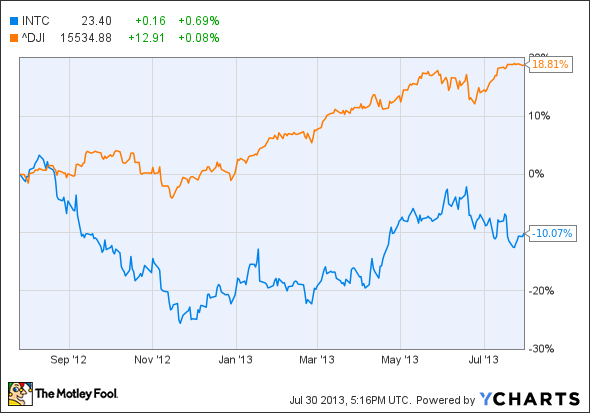Is Intel Really Worth $116 billion?
Shares of Intel are currently trading for about $23.30. That price gives the Dow Jones component a market cap worth $116 billion. Is the chip maker really worth that much? Or perhaps the stock is undervalued today. Let's have a look.
At today's prices, Intel shares sit just about halfway between their 52-week highs and lows.
A year ago, share prices had more than doubled from market-panic lows set in 2009. But investors quickly lost faith in Intel stock last summer, because tablets and smartphones were crushing the traditional PC market. And Intel was never much of a player in the mobile game. When fireworks lit up the New Year's night, Intel shares had fallen 23% since the August peak.
The stock has made a decent comeback in 2013, but it's not a full recovery. All told, Intel shareholders (including yours truly) are lagging the Dow over the last year.
So it's safe to say that Intel shares aren't riding any kind of momentum bubble right now.
Intel's P/E ratio is a historically low 12.6 times trailing earnings. Only five Dow stocks trade at lower P/E ratios today. Microsoft is one of them, trading at 12.3 times earnings under the same PC-market pressure that's haunting Intel.
I would argue that Microsoft deserves a bargain-bin valuation, whereas Intel doesn't. That's why I own one stock and not the other. Both companies have largely failed at penetrating the mobile market so far. Intel's mobile processors haven't gained any traction with system builders. Microsoft tried its hand at self-branded tablets while pushing Lumia smartphones through chief partner Nokia, and the two companies are still searching for their first success stories. However, Intel broke out with a new chip that actually appeals to tablet builders.
Moreover, Microsoft's tenure in the data center is fading. In a survey by analyst firm IDC, Windows-based servers saw their market share stalling in 2012, while Linux systems are growing. Sales of server systems based on Intel-compatible chips grew 4.1% last year, even as the overall server market shrank by 1.9%.
In other words, Intel is making inroads into the new computing model while dominating the established market. Microsoft can't make these claims, and yet the two stocks can be bought for very similar P/E markups. I would argue that Intel deserves better. Microsoft is fairly valued at best, and overvalued if the recent restructuring gamble doesn't pan out.
So what's Intel really worth? Analysts currently believe that the company will grow earnings by 11% a year for the next 5 years. I think that's a very conservative estimate, given Intel's market power and its 28% growth rate over the last 5 years, but let's go with the Street's view.
Plugging that growth rate into a discounted cash flow calculator, I arrive at a fair price of at least $30 per share. Like I said, I don't agree with the future growth-rate assumptions here, and believe that Intel is worth more than that.
But there you have it: Intel should be worth at least 30% more than the current price tag. Intel has earned every penny of its $117 billion market cap, and more besides.
It's incredible how much our digital and technological lives are shaped by just a handful of companies. Find out "Who Will Win the War Between the 5 Biggest Tech Stocks?" in The Motley Fool's latest free report, which details the knock-down, drag-out battle being waged by the five kings of tech. Click here to keep reading.
The article Is Intel Really Worth $116 billion? originally appeared on Fool.com.
Fool contributor Anders Bylund owns shares of Intel, but he holds no other position in any company mentioned. Check out Anders' bio and holdings or follow him on Twitter and Google+. The Motley Fool owns shares of Intel and Microsoft. Motley Fool newsletter services have recommended creating a bull call spread position in Intel. Motley Fool newsletter services have recommended creating a bull call spread position in Microsoft. Motley Fool newsletter services have recommended creating a covered call position in Nokia. The Motley Fool has a disclosure policy. We Fools may not all hold the same opinions, but we all believe that considering a diverse range of insights makes us better investors. Try any of our Foolish newsletter services free for 30 days.
Copyright © 1995 - 2013 The Motley Fool, LLC. All rights reserved. The Motley Fool has a disclosure policy.


